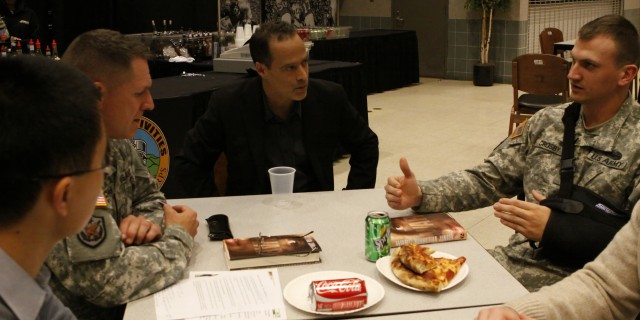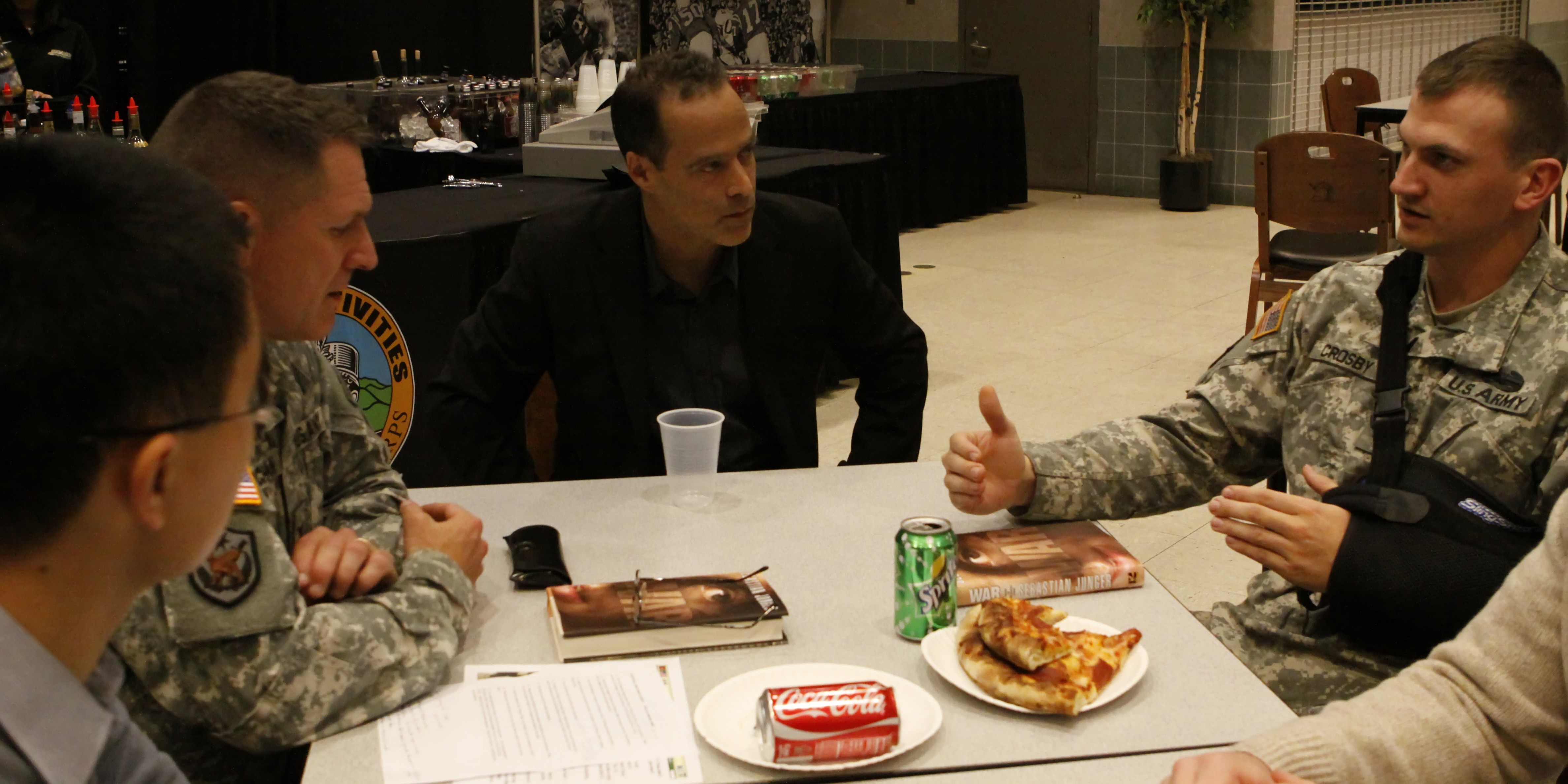
WEST POINT, N.Y. (Dec. 8, 2010) -- In the course of 15 months, author Sebastian Junger and photographer Tim Hetherington made five trips into the Korengal Valley. Dubbed the "Afghanistan of Afghanistan" by Junger, the Korengal had a reputation of affecting Soldiers adversely-a combination of fierce fighting, bouts of boredom and fatigue.
"Pretty much everyone who died in the valley died when they least expected it, usually shot in the head or throat, so it could make the men weird about the most mundane tasks ... The men just never knew, which meant that anything they did was potentially the last thing they'd ever do," Junger wrote in the novel "War."
The Vanity Fair correspondent embedded with 2nd Platoon, Company B of the 173rd Airborne Brigade to document the paratroopers' mission, but emerged with much broader themes.
"War" was the topic of discussion Nov. 29 at the second Comm's Reading Club meeting of the semester. Joined with Hetherington, the collaborators first sat for an informal Q&A with the club's mentors-senior officers who would later discuss with cadets the topics relating to the book and the documentary, "Restrepo," which was an outpost named in honor of a fallen combat medic.
Junger and Hetherington shared observations of war objectively, noting the troops doing the fighting wore uniforms nowhere near the standards of a garrison Soldier because they were "victims of their circumstances," Junger said. In the novel, he wrote they would counter an attack shirtless, with cigarettes dangling from their mouths.
"But even shredded uniforms couldn't betray the fact they were great Soldiers," Junger told the West Point officers.
More than 250 cadets gathered at Eisenhower Hall to discuss the book's topics with about 50 mentors-most of whom recently returned from deployments in Iraq or Afghanistan. Conversations delved deep into talk of leadership functions, combat and other subjects. Junger and Hetherington rotated among the tables to add to the dialogue.
Class of 2012 Cadet Thomas Crosby was interested in Junger's ability to stay neutral in the midst of combat-never surrendering his role as an observer, yet forming strong bonds with the platoon.
"He explained that he had wanted to (fight) and then he had to figure out what it was that made him want to pick up a weapon," Crosby said. "He told us it was the longing to be a part of the group. It was the one thing that the Soldiers had together that he didn't. And no matter how close they got, there was still that divide, but he had to keep that to remain objective."
The novel is interspersed with research vignettes at pivotal moments. As Junger details the first firefight he witnessed, he segues into scientific prose on reaction times, if a person could literally dodge a bullet, and later on the effects of adrenaline and other chemical reactions in the brain.
The book is sectioned into wider themes: Fear, Killing and Love, and he spends ample time exploring into those universals.
"At my table, we used the "Fear, Love and Killing" topic to discuss the nature of emotions encountered on the battlefield and afterward," Class of 2011 Cadet Dan Alvey said. "We discussed, for example, how you will grow to love the men you are surrounded by, but that it has a limit in that you cannot allow that to lead to preferential treatment."
Junger revealed to the club his original intent-before deeming it too weird-was to write the entire book without any reference at all to Afghanistan. Dealing with universal themes requires no particular setting or situation.
"What we wanted to get out was not an analysis of Afghanistan ... but more universal about what war is like," Junger said.
Junger had previously reported on war, terrorism and human rights out of Kosovo, Bosnia, Sierra Leone and Liberia, and made previous trips to Afghanistan.
This was his first experience with real combat. Likewise, Hetherington had photographed war zones before, but was overwhelmed by what he witnessed in the Korengal.
"I thought it would be a quiet assignment in the valley, actually," Hetherington said. "The attention at that time was still mostly in Iraq. I was taken aback by the amount of fighting going on in Afghanistan. It was a real war, with a real body count and a real 'hearts and mind' battle going on."
One table discussed the book's true audience. Class of 2012 Cadet Joseph Amoroso first thought it was written to take those unfamiliar with combat troops and the war fought in the Korengal Valley head-first into the narrative of battle. Amoroso came to the conclusion that the book also serves as a testament to Battle Company and the journalists who followed them into the valley.
He said it was as much Junger's story as it was the Soldiers who fought and died there.
"The story of 'War' was like no other war book or war movie I have ever encountered," Amoroso said. "It is a different kind of war, unit and environment that makes the whole story surreal. I was humbled when reading the book and hope to someday be half as brave as the men of Battle Company."
The purpose of the reading club is for members to expand their knowledge base by reading more history as well as current events, according to Lt. Col. John Nawoichyk, Corps of Cadets operations officer. First with the novel "Black Hearts" and now with "War," cadets are provided a forum to discuss with senior officers the lessons learned from these books and develop a broader understanding of their subjects.
"Part of being a professional officer is to continue your educational process," Nawoichyk said. "That includes professional reading. The goal of this is simple: to promote the professional development of our first and second class cadets by engaging them with critical lessons learned by other junior officers in combat. The overarching goal is to get them to start thinking about some of these issues they may face not long after graduation."

Social Sharing